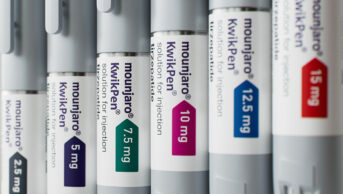
Shutterstock.com
A short course of antibiotics to eradicate bacteria that cause stomach ulcers can reduce the chances of gastrointestinal (GI) bleeding by more than half among patients given long-term, low-dose aspirin for heart problems, results from a study have revealed.
Low-dose aspirin is commonly prescribed for older people to reduce the risk of heart attacks and strokes; however, it is linked to a small increased risk of GI bleeding.
Researchers from the University of Nottingham ran a clinical trial, looking at whether testing for and treating Helicobacter pylori (H. pylori) — a bacteria that causes most gastric ulcers — would reduce the chances of people being hospitalised or dying from GI bleeding.
The study, which included 5,352 patients from 1,208 primary care centres in the UK, invited all eligible patients (aged over 60 years on low-dose aspirin, with at least four prescriptions in a year) to be tested for H. pylori, using a standard breath test.
Those who tested positive were randomly assigned to either a one-week course of eradication treatment (oral lansoprazole 30mg, clarithromycin 500mg, and metronidazole 400mg, taken twice daily for one week) or placebo. Patients were followed up for an average of five years.
During the follow-up period, 44 people had definite or probable peptic ulcer bleeds — 18 in the antibiotic group and 26 in the placebo group.
In the first 2.5 years, the difference between the antibiotic group and the placebo group was most marked, with 6 peptic ulcer bleeds in the antibiotic group, equating to 0.9 per 1,000 people per year, and 17 peptic ulcer bleeds in the placebo group, or 2.61 per 1,000 people per year.
During the remainder of the follow-up period, there was less difference, with 12 peptic ulcer bleeds in the antibiotic group, equating to 1.75 per 1,000 people per year, and 9 peptic ulcer bleeds in the placebo group, equating to 1.33 per 1,000 people per year.
The researchers said this showed the benefits of treatment were strongest in the time period immediately after treatment.
Trial leader Chris Hawkey, professor of gastroenterology at the University of Nottingham’s School of Medicine and Nottingham Digestive Diseases Centre, said: “We are pleased that the findings have shown that ulcer bleeding can be significantly reduced following a one-week course of antibiotics.
“The long-term implications of the results are encouraging in terms of safe prescribing.”
Commenting on the study, Paul Wright, lead cardiac pharmacist for Barts Heart Centre at Barts Health NHS Trust, questioned the feasibility and cost-effectiveness of widespread testing for H. pylori in all patients taking aspirin.
“I think there’s going to be difficulties in translating this into practice; it’s unlikely we’d be testing everyone going on to aspirin but perhaps selecting high-risk individuals for testing would be a more pragmatic approach going forward,” he said.
“That being said, there are a few caveats — one is the aspirin dose was 325mg [or less] — how applicable are these findings to lower doses? Also, it may be better to suggest another antiplatelet, like clopidogrel, that has less of a bleeding risk, than to put someone on an antibiotic.”
- This article was updated on 3 January 2023 to correct an error regarding which group had 17 peptic ulcer bleeds in the first 2.5 years. It originally said the antibiotic group but it has now been corrected to the placebo group.


